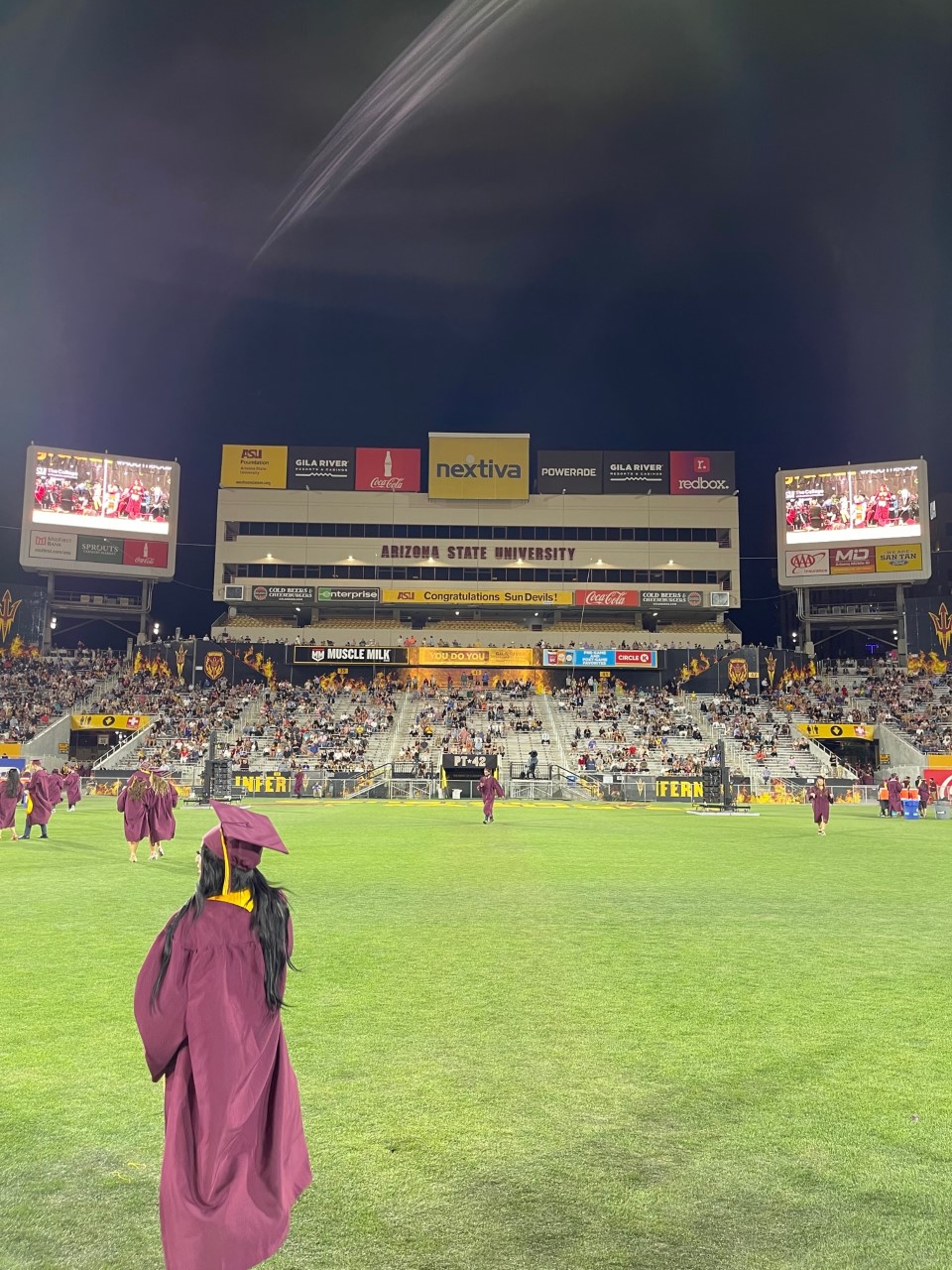Hi guys!
So as promised, I am going to give you a full rundown of my experience going to graduate school for a Master of Arts in Communication. If you are considering this degree, my story may help you decide if it is right for you!
Enjoy! 🙂
The Visit That ‘Sparked’ Me
The journey began before I flew home from my trip to Sedona out of the Phoenix Airport in June of 2020. Since I had half a day to kill before my flight, I decided to check out the Arizona State University (ASU) campus.
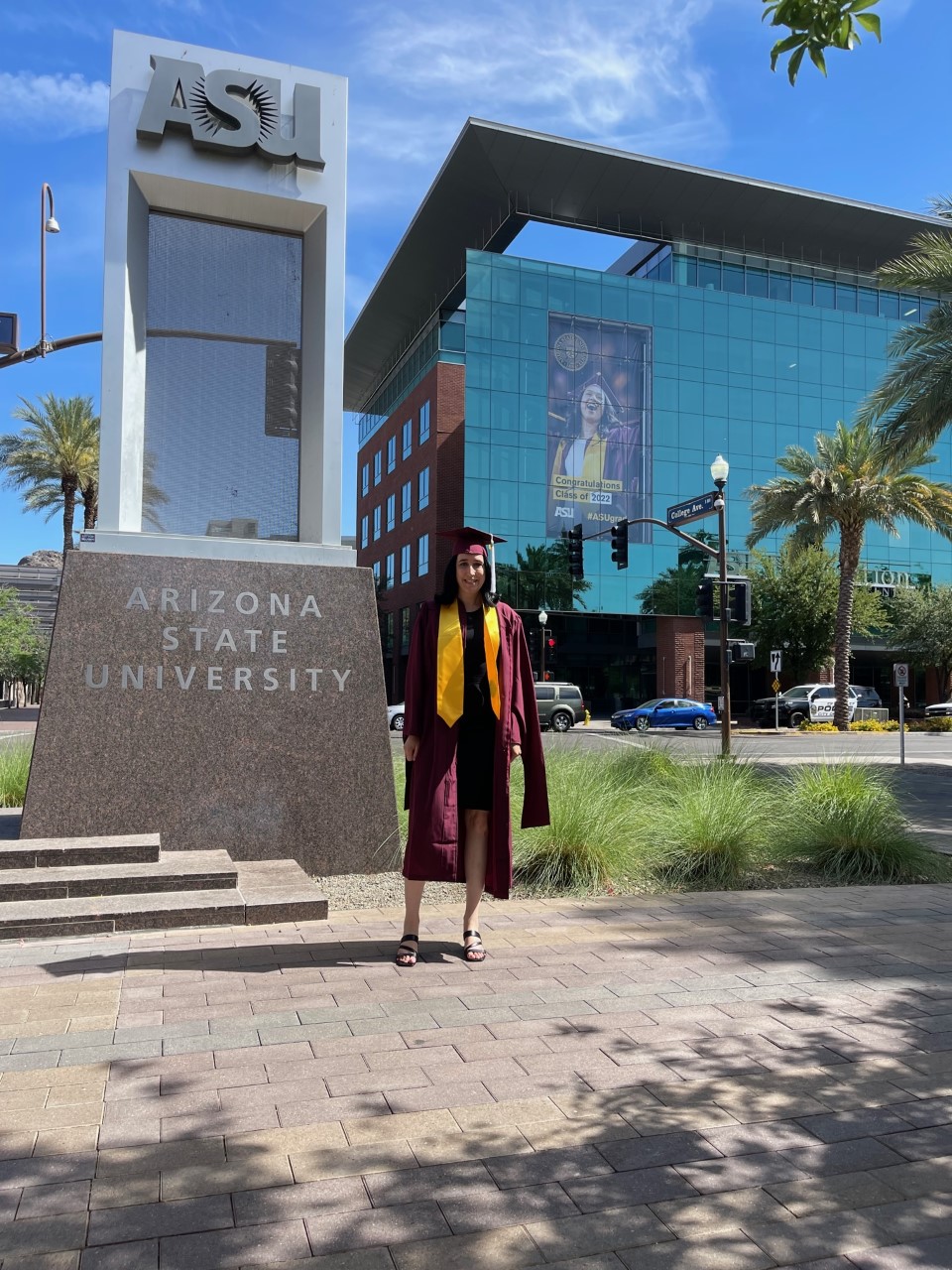
ASU was always my dream school to attend for journalism during my undergraduate years. It has one of the top programs in the country and I always wanted to graduate as a Sun Devil (the mascot is named Sparky BTW)!
After I graduated high school, my dad made me an offer I couldn’t refuse: he told me that if I stayed in Minnesota, he would pay for my tuition. I didn’t want to be in debt, so I took up on his offer. In Minnesota, the two best schools for journalism are the University of Minnesota – Twin Cities and St. Cloud State University. I decided to go to St. Cloud State. I don’t have any regrets and I loved my undergraduate experience! I even won my first Associated Press award through the campus radio station, KVSC-FM, for covering a plane crash that killed one of our senators and I was able to have some amazing internships.
Reasoning
Fast forward 18 years later, I found myself driving around the ASU campus enjoying the layout. I wasn’t thinking much of it until I got back to LA. At the time, COVID-19 was at its peak and graduate schools across the country were waiving the GRE tests and lowering tuition fees. I always toyed with getting my master’s degree and since my freelance journalism was drying up, I thought, why not? Now is the best time during the pandemic!
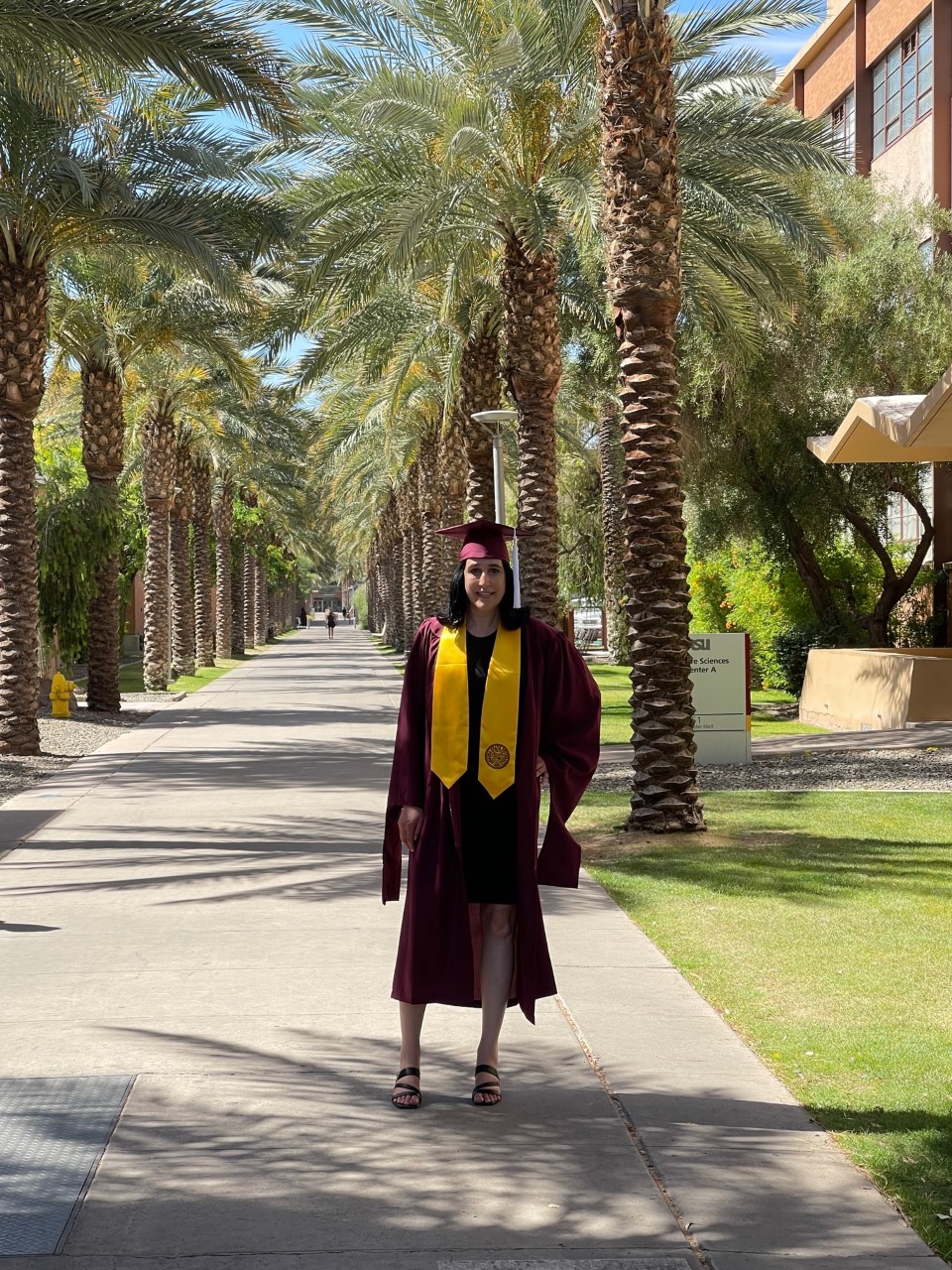
My overall reasonings for getting a master’s degree are not the same like an average person. I was doing very well financially (and still am) and had a ton of work experience at age 40 by that point, so that wasn’t the issue. I just always wanted to get one and prove to myself that I could do it! I guess if I had to look at how it could benefit me today is that it gives me another layer of “protection” (especially living in LA, it’s all about being more educated and having experience!) if I do decide to move onto another job or relocate in the future.
Advice #1: When considering graduate school, what are your reasons? For a better paying job? Higher salary? Wanting to pursue a Ph.D and teach? Reasons are different for every person and I highly suggest weighing the pros and cons before making a decision!
Graduate School Choice
So before I officially decided on ASU, I looked at other graduate communication online programs to see what they had to offer. The reason why I chose to complete it online was because I wanted something flexible/at my own pace, which made sense since I live and work full time in LA! I was looking for a program that had nothing to do with media (e.g., news, public relations, advertising) since I already had a ton of experience with it. I wanted a program that focused more on corporate/organizational communication that tied in a bit of leadership, something I also had enough professional experience with but wanted a slightly broader outlook.
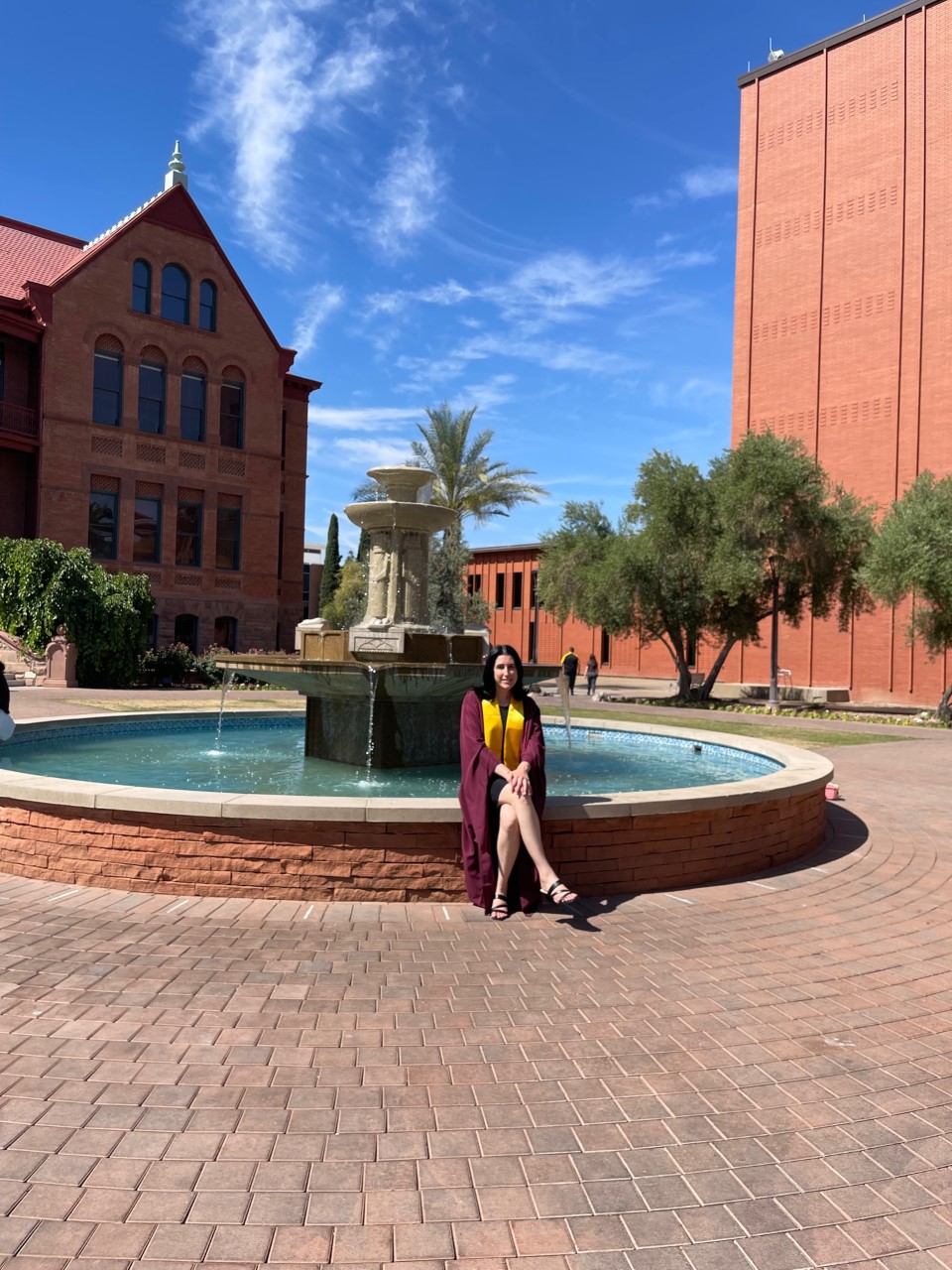
Besides ASU, I also considered Gonzaga University, University of Colorado – Boulder and the University of Southern California (USC). ASU and USC were my top choices. The only thing that stopped me was USC’s program was $53,000 while ASU’s was $20,000 (I’m rounding these figures BTW), which makes sense since USC is a private school and ASU is a public school. I was still more impressed with ASU’s program and courses and on top of that, it was always my dream school! So I applied to the Hugh Downs School of Human Communication with my resume, statement, transcripts and fees. No GRE or letters of recommendation were needed! ASU BTW is also a top tier school, so I felt for the value it was worth the price!
Advice #2: When researching schools, consider not just the cost but the courses itself and what you want to your concentration to be. Also look at school rankings. Your masters is going to be your alma mater and rankings can show how reputable the education experience is! Do you also want an online program? In person? Ask yourself what your learning style is!
Note: I had a couple alternate ways of paying for graduate school that I would like to keep private. All I will say is that I graduated debt free!
Acceptance
I think it was a couple weeks later when I got my acceptance letter emailed to me in June of 2020. I screamed with joy and I almost cried, I was finally going to attend my dream school! I had a brief introduction call with the program advisor and just like that, I was registered for my first two core classes!
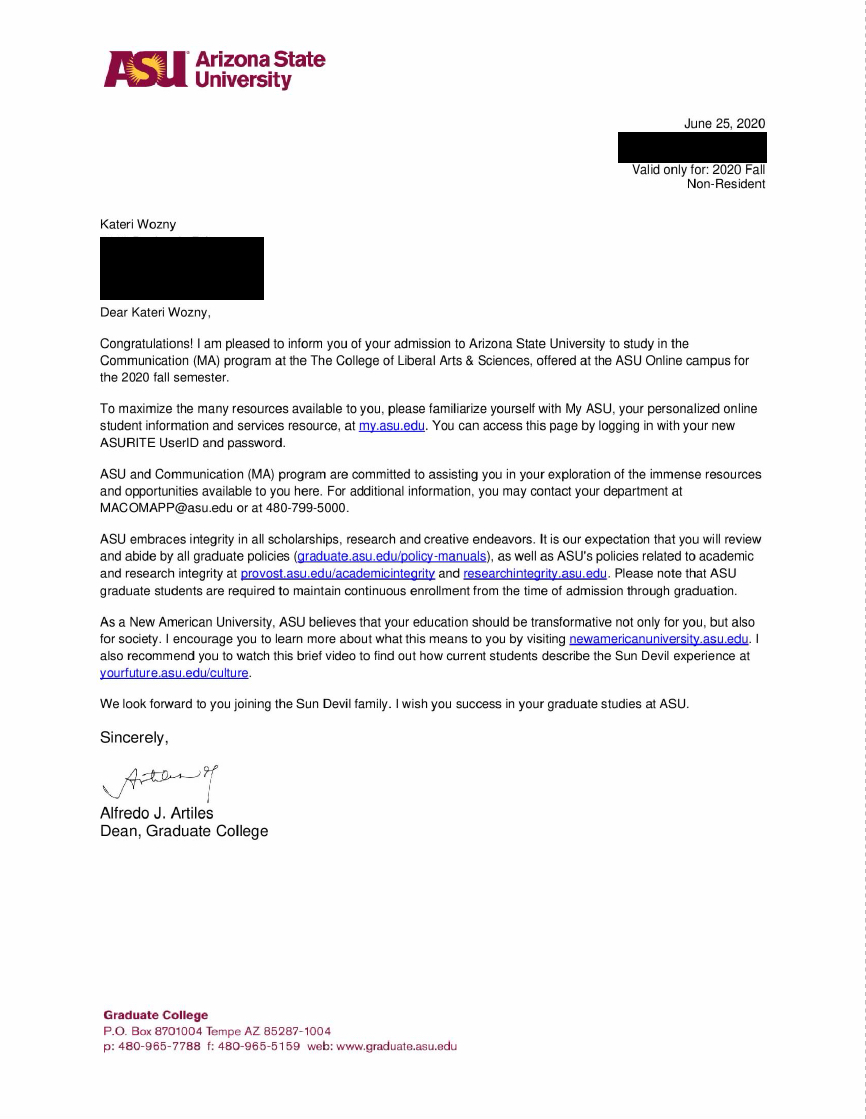
Advice #3: Go out and celebrate when you learn of your acceptance into your master’s degree program!
Layout, Courses and the Emotional Rollercoaster
ASU’s Online M.A. in Communication program consists of 10 courses (30 units), with 3 of those being cores, 6 being electives and 1 being the Capstone. Each class consisted of a ton of research papers in APA format and discussion boards except for 2 courses. A few of them also had quizzes, something I am not a fan of but dealt with! The program is also an accelerated format, meaning there are 2 sessions (A and B) in a semester that are 7 1/2 weeks long for spring and fall while the summer sessions are 6 weeks, so I took one class per session (2 classes a semester).
ASU also uses Canvas, a learning management system as a way to read about the assignments in the modules or the required journals, interact with the professor or students, post and reply in discussion posts and turn in assignments. It’s very easy to navigate!

ASU claims that the program is “rigorous” but here’s the thing: I didn’t find it to be that way at all! I think it’s because I spent so many of my professional years writing news stories that it came very natural to me. I would say it was a lot of critical thinking and time consuming but the writing was the fun part!
I also want to state that I am the type of person that works ahead of deadline, so I could easily get the sessions done in about 2 to 2 1/2 weeks. I had it down to a science: one day a research paper, the next day a discussion post, and vice versa. Most classes had 7 modules with discussion posts and papers. I also had more “time off” because of the way I approached tackling the assignments. Looking back, there were a couple of classes I wish I would’ve taken my time with but I was so paranoid that something major would come up at work that I would be more drained in the evening when studying, so it was best to get it done ahead of time!
Goal
My biggest goal was to graduate with a 4.0 and I was determined to achieve it. I think it was because in my undergraduate program I graduated with almost a 3.0., I was so close! I had a B- average, I wasn’t lazy or partying but the general education requirements – especially the math, science, and a few Spanish and music classes (I minored in music and Spanish) – were killing me, plus I was so burnt out! By the time I got into my journalism program, which was the last 2 years of my schooling, I started only getting As and Bs. So that’s why I was so determined to get straight As in my master’s program, plus communication is a subject area I enjoy!
Note: If you see a black box on the following screenshots, I wanted to protect the identity of the professors!
Fall 2020 Semester
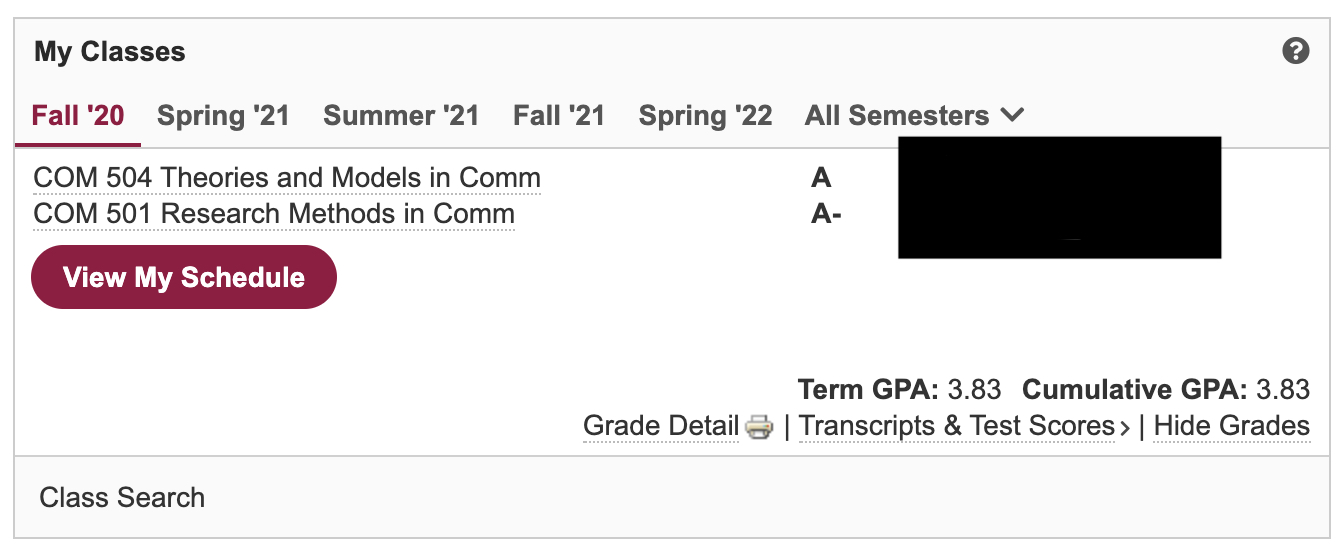
Communication Theory (Core): A
Communication Theory was the first class I ever took and it taught me about the different theories surrounding communication (e.g., Social Exchange Theory, Role Congruity Theory, Interpretive Theory, Critical Theory, etc.). This was the class where my professor told me that I was “born to be a graduate student!” That really gave me the confidence moving forward. I felt like the rest of the program was going to be a breeze from a writing perspective!
Communication Research (Core): A-
Communication Research was the first class that made me shed a few tears and also my “lowest grade” that I received (it’s kind of funny looking back on it). In it, I had to learn different research methods (e.g., rhetorical and postmodern critiques, interviewing, ethnography, surveys, content analysis, etc). I also had to take a statistical quiz that I was lucky to receive a low A on.
I was so relieved to be done after my second class! The grader also made me roll my eyes a few times and I was slightly frustrated. Then I had 7 weeks off for winter break before returning in the spring. I also had gone on two local trips in SoCal to Julian/Salton Sea in September and Death Valley National Park in November. It’s important to mention that trips that I took because I cannot stress enough to try and relax/take a mental head break from school! I didn’t think I could pull it off at first but if they were very short trips, it was fine.
I forgot to add: the research class is also where I met my first classmate named Hannah! I was fortunate to have met her in person for coffee when I went to Tempe to graduate. We didn’t graduate in the same semester but still keep in touch!
Spring Semester 2021
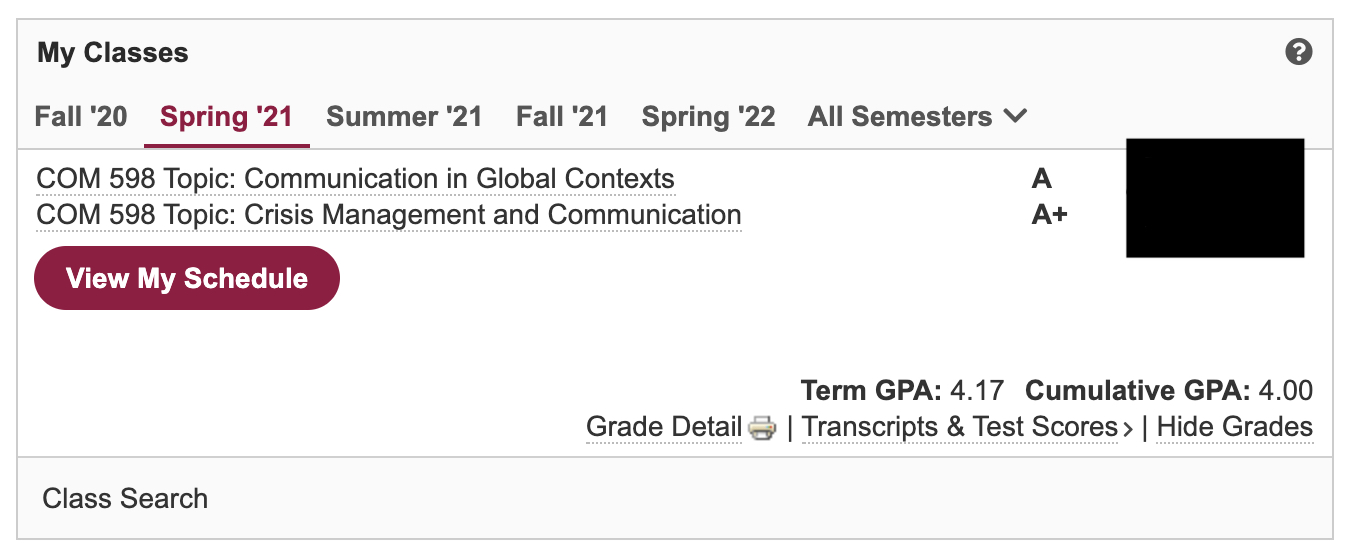
Communication in Global Contexts (Elective): A
By the time I got back from winter break, I was well relaxed and ready to tackle the spring semester! The Communication in Global Context class covered networks, infrastructures, social justice and civic change in a globalized world with assignments that focused on ethnography, interviews and other analytical research papers as well as a few quizzes. I felt toward the end like the professor was fed up or not feeling well (we all felt bad because she was suffering from migraines) but after this class, I never saw her scheduled for future classes at ASU. Nonetheless, I got an A!
Crisis Communication (Elective): A+
Everyone that I had made friends with on the ASU Hugh Downs School of Human Communication Facebook Group kept saying to me, you have to take this professor for a couple classes, he is laid back and amazing! Hence, I listened and the Crisis Communication class was my first with him. It focused on pre-crisis, crisis and post-crisis and how to prevent, create or mitigate one. This was something I had way too much experience with working in news and public relations/public affairs, so it was pretty straight-forward to me! My final paper was actually on the Borderline Bar & Grill Shooting in November 2018 and how the Ventura County Sheriff’s Office handled the crisis. Luckily, the report had just come out a few years later, so the timing was perfect!
During this semester, we did not have a spring break due to COVID-19 being at its peak, so ASU decided to have the sessions back-to-back like they do in the fall and then have a month off before the summer semester began. Thank god because I had accepted a new job and was in the middle of moving to Pasadena!
Summer Semester 2021
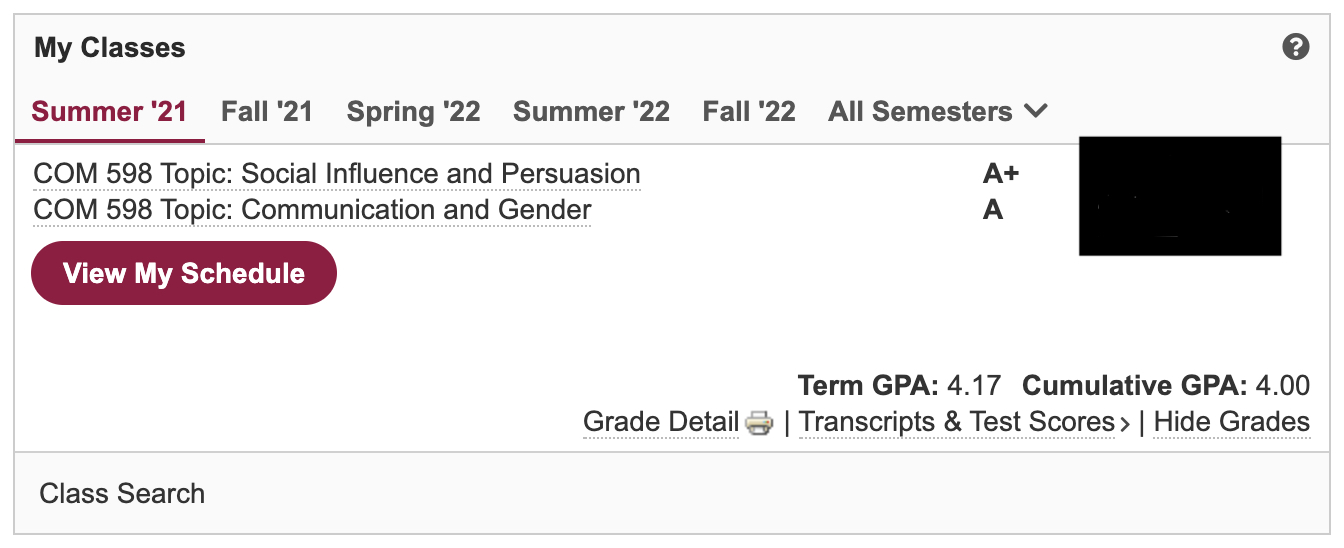
Social Influence and Persuasion (Elective): A+
Social Influence and Persuasion was another class taught by the professor who taught Crisis Communication, so I was incredibly happy to have him again! This class focused on the different concepts, behaviors and attitudes in the workplace and consisted of research papers and one interview paper. I would honestly say this was the easiest class I had since Communication Theory!
Communication and Gender (Elective): A
Communication and Gender focused on…well…how communication and gender are roles in the workplace (e.g., glass cliff, bullying, LGBTQ). It consisted of analytical research papers (and I mean it was a TON of journal articles!) and the final paper I chose to do a recorded interview with my human resources representative of my organization along with a paper.
By the time the semester was done I was burnt out. I hated my program because the professor I had for this particular class played a few head games and at the age I’m at, I didn’t appreciate it. It wasn’t fun. Even though I had aced the class, I wasn’t happy anymore. My sanity was gone and my anxiety was at its peak (I ended up talking to someone in my last semester to learn the tools to control it. I am much better now!). I just wanted a long break, but unfortunately, I only had one week before fall semester began. It’s important to note that in between both of the sessions I took a trip up north to Mammoth for a long weekend for another head break/relaxation period.
Fall Semester 2021
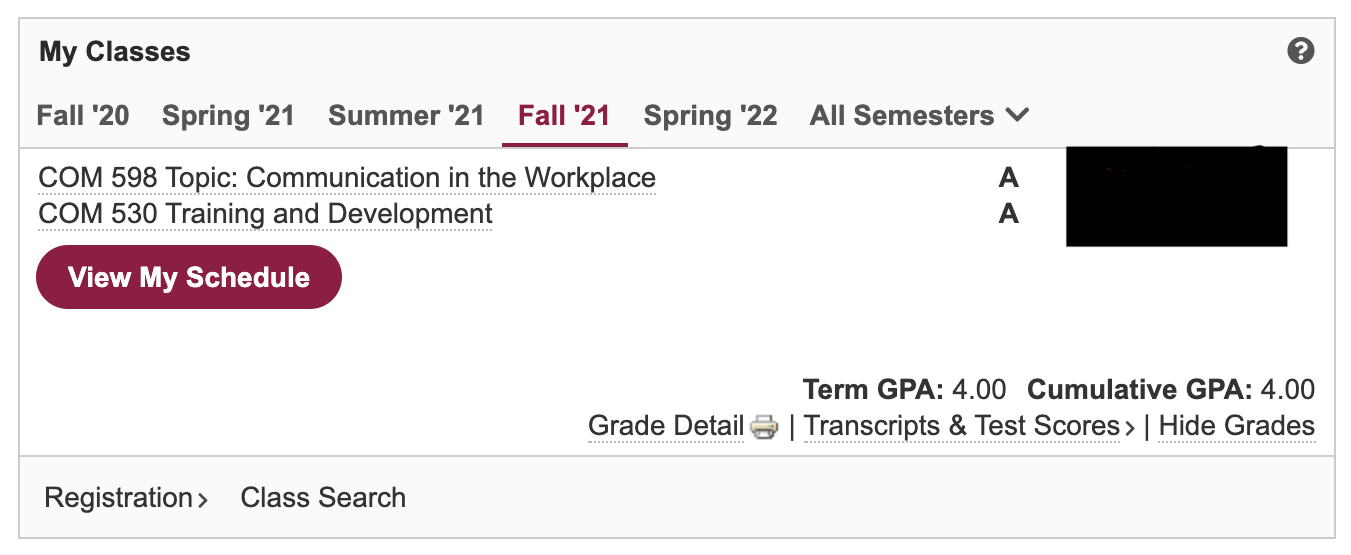
Communication in the Workplace (Elective): A
The Communication in the Workplace class discussed technology implementation, knowledge management, virtual work, workplace diversity, leadership, social capital, organizational identification and socialization. It had a combination of analyzing an organizational diagram and research papers. Our final project was a policy writing assignment and even though I was proud of the work I had done, I learned that I did not like writing policies! There was a point where I thought about going for a master’s degree in Public Policy at another school and I’m so glad I didn’t!
Training and Development (Elective): A
I absolutely loved the Training and Development class! This class taught me how to conduct a needs analysis, design a T&D, conduct a delivery and write an evaluation. I had so much fun designing my PowerPoints and presenting it to my two other classmates, Toni and Raquel! We had to meet once a week and took turns presenting our trainings on a specific topic. Since I have been working in the liquor industry and executing events for the last 19 years, my final project was on wine sales and communicating it to the customer. I had to design and develop a PowerPoint and also make a video recording. It was fun!
I also still talk to Toni and Raquel to this day, they are amazing, hard working women, so shout out to them! 🙂
In between my sessions I also took a long weekend to Yellowstone and Grand Teton National Parks for another head break.
Spring Semester 2022
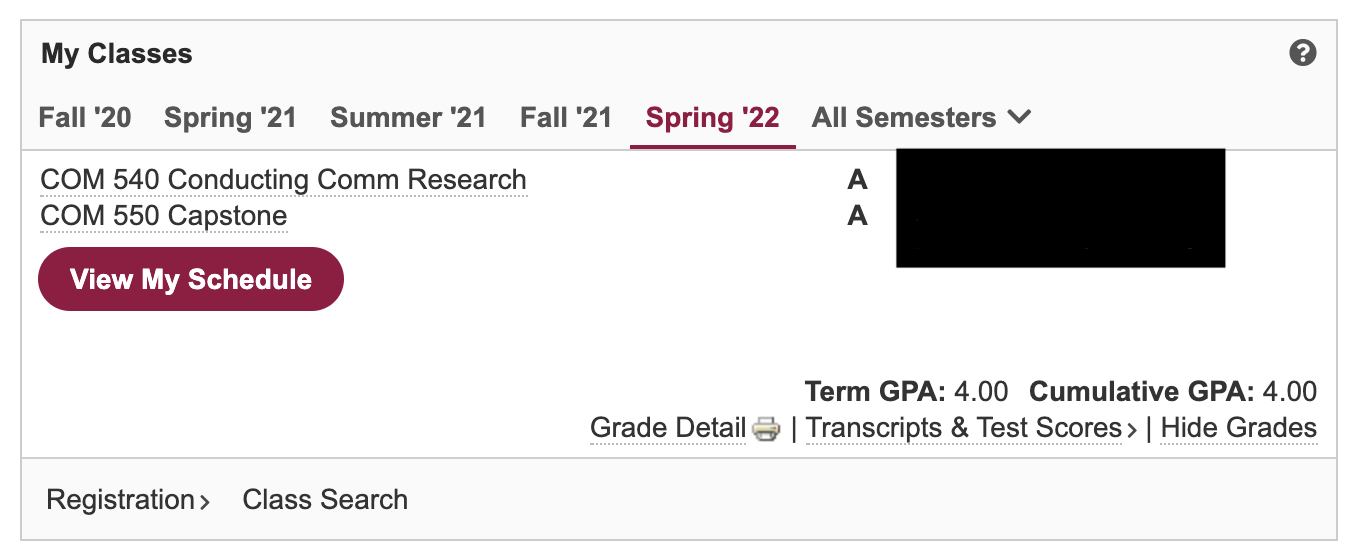
Communication Research (Core): A
Communication Research was the groundwork for the Capstone project. Having taken the Training and Development and Communication Research classes also came into play in this course. Besides research papers, there was also an interview with my lead to undercover a communication problem, a survey I had to develop to send to my team members, a findings report, the problem that was uncovered and the solution steps to address it. I also got introduced to Digication, an e-portfolio site ASU uses, and I had to create a mini version for this course (it was a get your feet wet kind of thing before I did the big one in the Capstone).
With this class, you never knew how the visiting grader was going to score you. I was lucky to hit at the very least an A- on a couple assignments and As on the rest, while other classmates I knew got Bs or Cs! This class was somewhat vague and made you feel constantly on edge questioning your choices. I had heard it was a vague class but also more “freeing” because it was supposed to be your own research style, but the grading at times made no sense. Nonetheless, I was happy to get out of it alive and this was the first class I went week-by-week with!
Capstone (Cumulative Experience): A
All I can say is I enjoyed the Capstone a lot more than the research class! The Capstone takes everything you learned in the core and elective classes and combines it into a huge Digication with Welcome, Background, Organization, Assessment, Problem, Solution and Follow-Up sections. I also had a faculty mentor that I met with a couple times to give me some feedback on how to improve it, which was very minor details. I got the whole Digication done in almost 3 weeks because I just wanted to be done with the program. When I got an alert that I received an A+ on the final project, I was in the grocery store and the cashier lady was the first person I told, LOL!
By the time I was halfway through the semester, COVID-19 restrictions began to ease up a lot in the U.S., so the timing was perfect. The good news was this: I graduated with a 4.0 GPA, which was my main goal the whole time!

Other electives I didn’t take were Conflict Resolution and Negotiation and Persuasion. I heard Conflict consisted of a final group project, something I didn’t want to do, and Negotiation was very heavy on critical thinking and papers. They also both had simulation experiences to select the best answer and journal what you learned. Plus, I have real life experience negotiating, so I am still happy with my elective choices!
Graduation
It was very important for me to attend my graduation in person because I wanted the experience and a lifelong memory. It is also a huge accomplishment! You can read more about my experience in a previous blog, but as I stated, ASU has two different types of ceremonies I could have attended: the Graduate Commencement and The College of Liberal Arts and Sciences Convocation. The difference between the two is at the Graduate Commencement (all colleges at the university), Master’s graduates are only hooded (drapes over the back of your neck) by faculty on the main floor and then return to their seats to listen and watch the rest of the ceremony. Only the Ph.D students are allowed to walk the stage and have their pictures taken! At the Convocation, Ph.D graduates, Master’s graduates and Undergraduates are allowed to walk the stage, have their names read have their picture taken and received a video montage clip of them walking the stage. I chose the latter because I really wanted the experience of walking across the stage!
After I got back to my Airbnb, I cried a bit, because I was closing a chapter and the program had been a huge part of my life, especially during the peak of COVID-19! I felt better once I came back to LA and had more time to reflect on my journey. I am currently getting back in another “normal” routine and I even returned to freelance journalism recently. It feels good to get back to myself again!
Below are some shots from graduation and on the ASU Tempe campus.
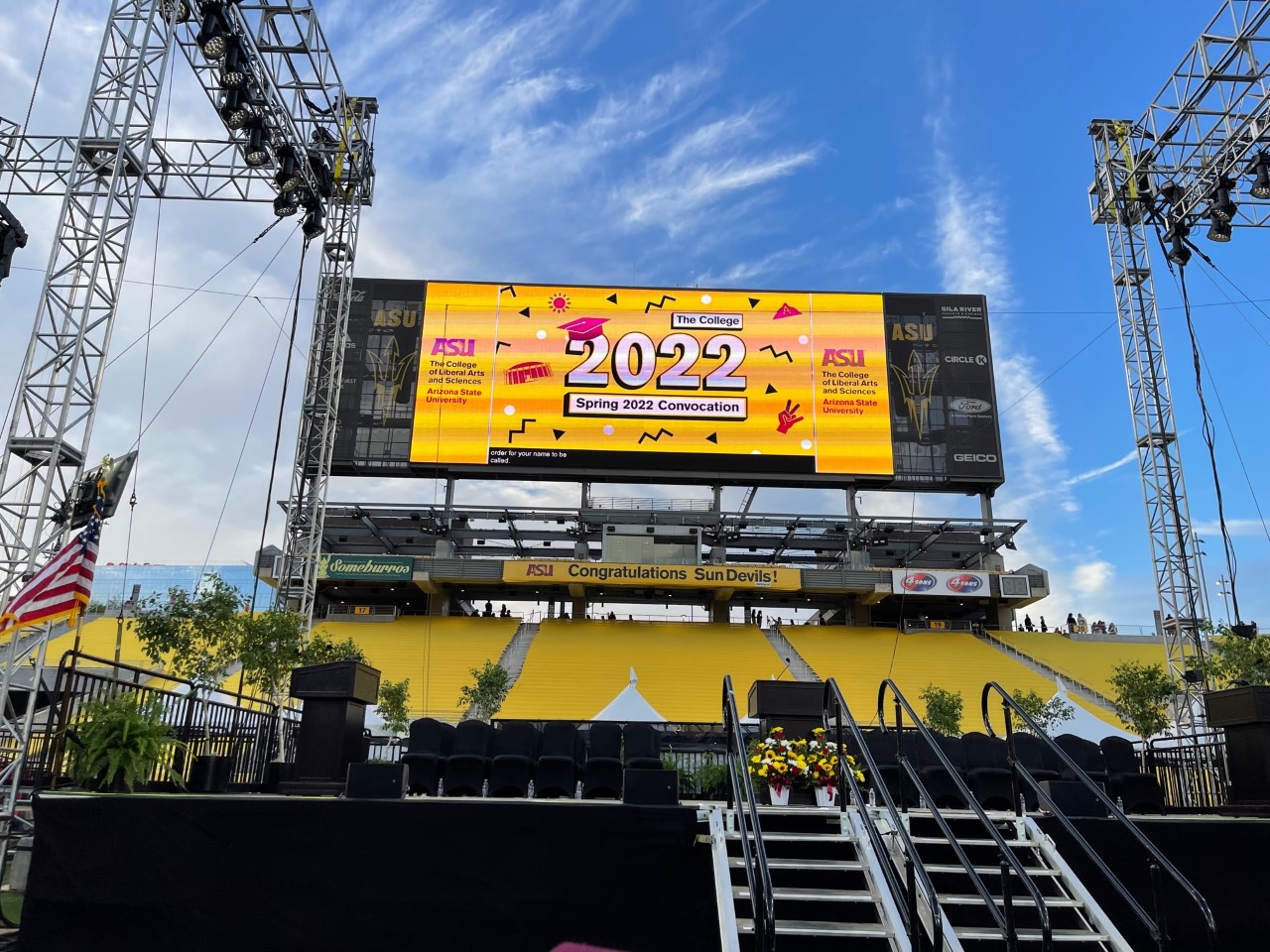
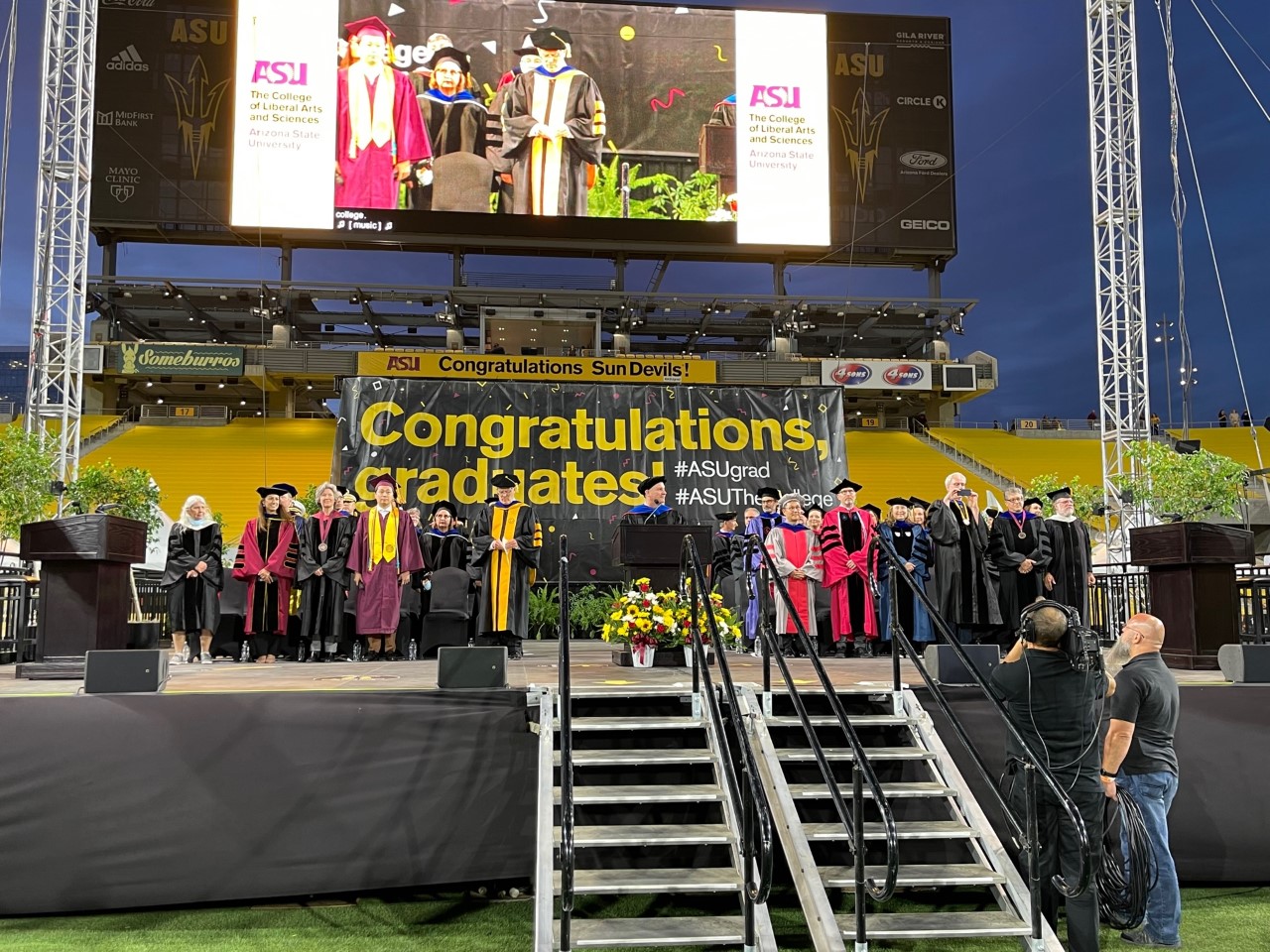
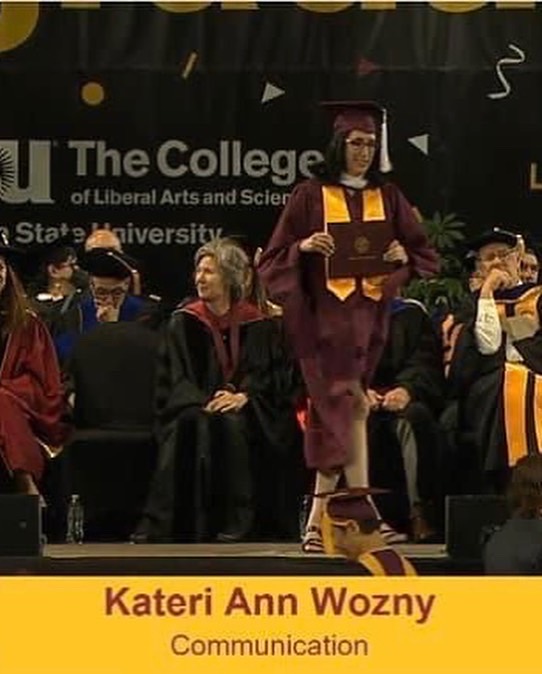
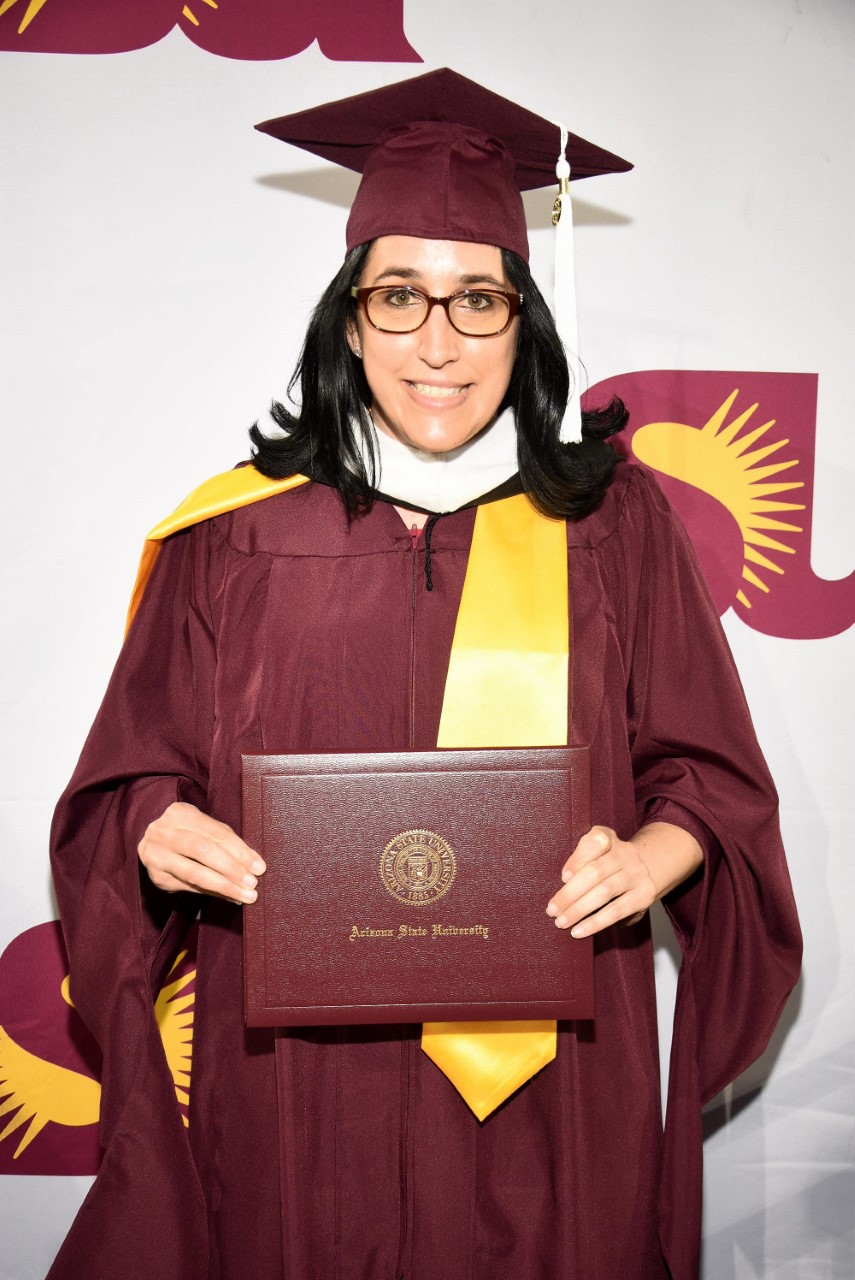
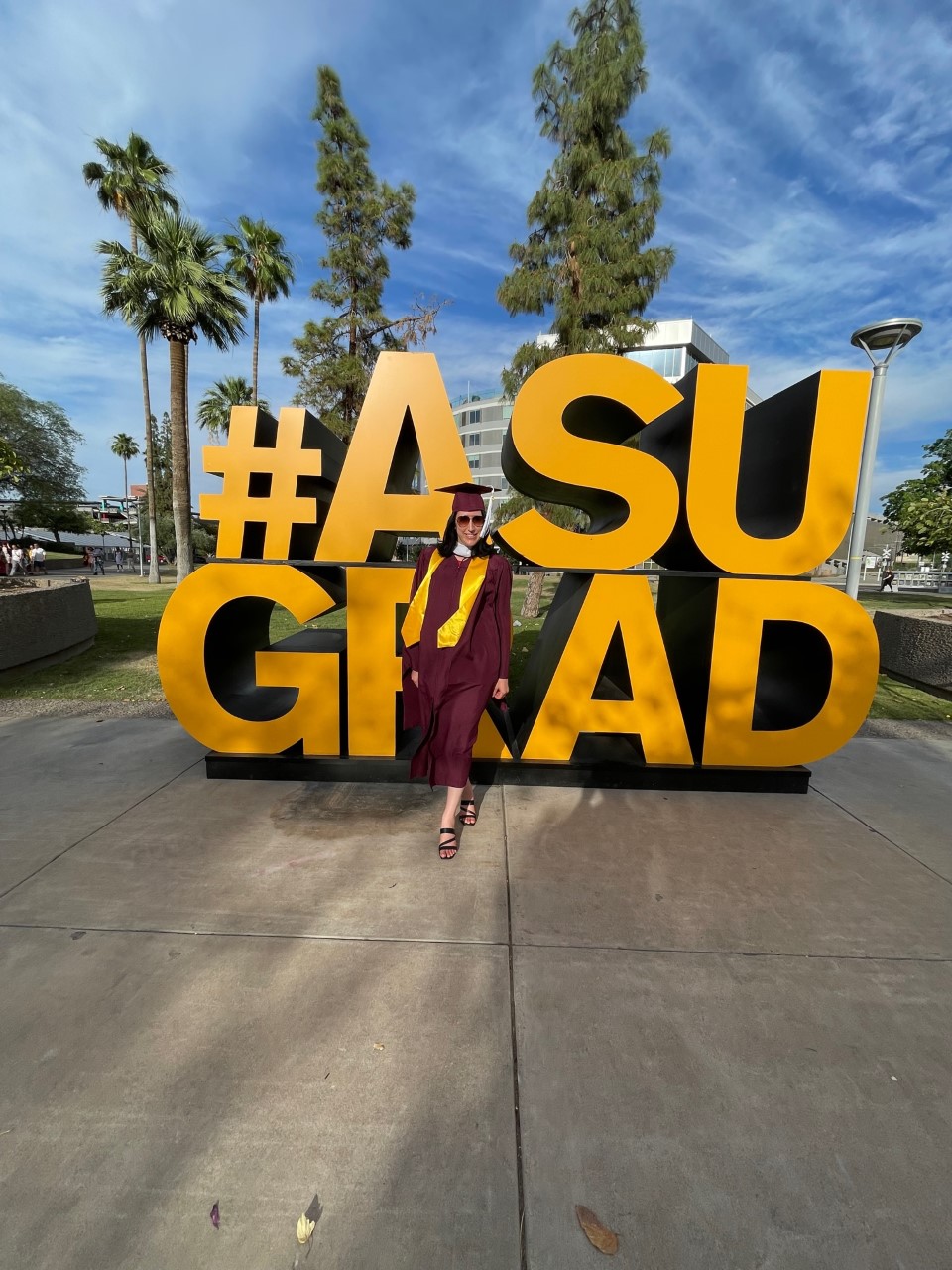
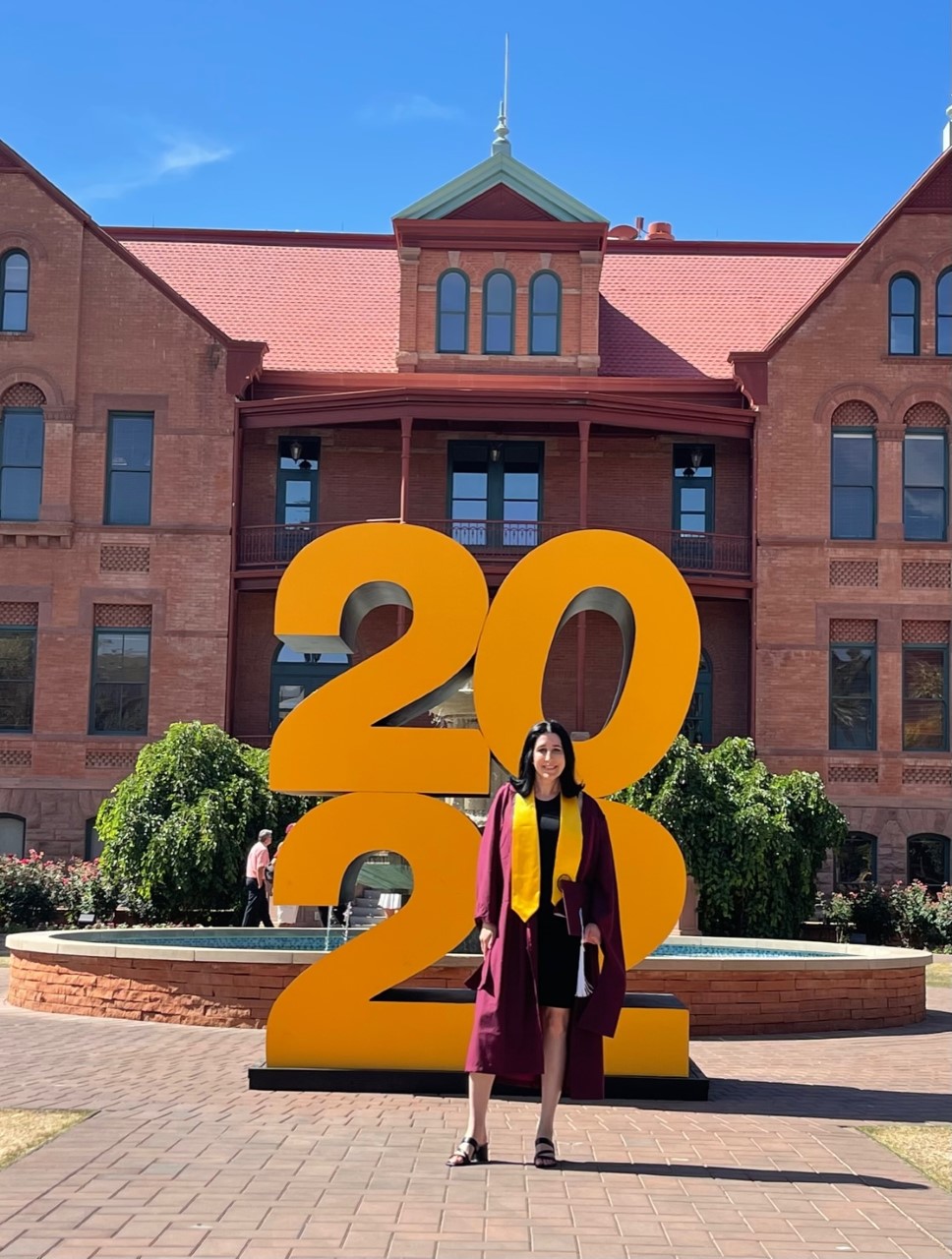
Overall…Was It Worth It?
So my final thoughts on if going for a master’s degree in Communication was worth it is this: it depends on where you are currently at in your life and long term goals.
Obviously, as I stated above, my reasonings weren’t the same as most people. I know people say that you are never too old to receive a degree and I do agree to an extent. To be honest, I think it would be more beneficial for people to obtain it in their late 20s to mid 30s based on the common factors of wanting a better job title and salary over time. I definitely would say have some work experience behind your belt before jumping into any type of master’s program because it will help you apply it to the concepts and theories in the classes! Some people may disagree with my thoughts and that is ok, it’s just my opinion based on observation. I know there are other fields that require you to have some type of postgraduate degree (e.g., social work, law, psychology, etc.) right after obtaining your undergraduate, which is understandable. Some people also want to go on and get their Ph.D and teach at a university, which is amazing because we need professors!
I had a student who graduated the semester I was starting the program tell me that a master’s degree is what you make of it. It couldn’t be more true but also be prepared to go through an emotional rollercoaster. I cannot express enough to have a huge support system behind you – whether it’s family, friends, colleagues, other classmates – it really does help! I laughed, cried, threw a tantrum – I went through it all, LOL! As far as making friends online, I made three: Toni and Raquel in the T&D class through Zoom and Hannah I think I messaged randomly in Canvas. I did have some students not engage with me at all while others were in passing. I am so grateful for their support and vice versa! I really never felt lonely either because we were all going through the same thing together, LOL!
There were times where I started to feel like no one understood me except my classmates because unless someone has gone through obtaining this type of degree, how could an average person really understand? One time I had a Facebook friend, who had two master’s degrees, tell me that these types of programs can help with critical thinking. I snapped at him because that is what I had done in my jobs already, especially in journalism, where you are constantly researching/interviewing/writing and basically being on a hunt all day thinking outside of the box! I get what he was saying, but at the time, every little thing just annoyed me.
For me, looking back now, I definitely think it was worth it because I was able to achieve one of my lifelong goals of not just obtaining this type of degree but also attending my dream school! So I killed two birds with one stone. 😉 I will have to keep you updated in the future to see how having a master’s degree helps or doesn’t help in whatever I might decide to pursue later in life (BTW, I do not want to go and get a Ph.D., this was enough for me!).
If you have a master’s degree, are currently in a master’s program or are thinking about obtaining one, what are you thoughts? 🙂
Thanks for reading and for everyone’s support!
